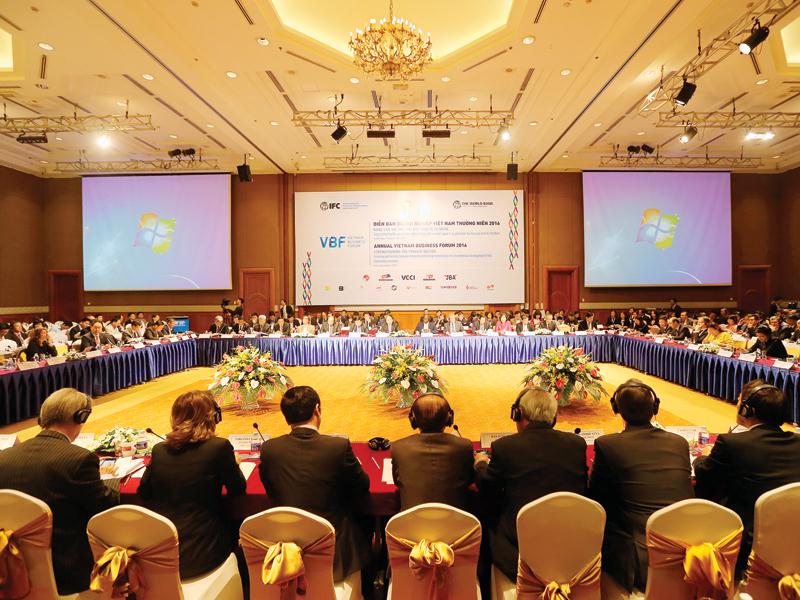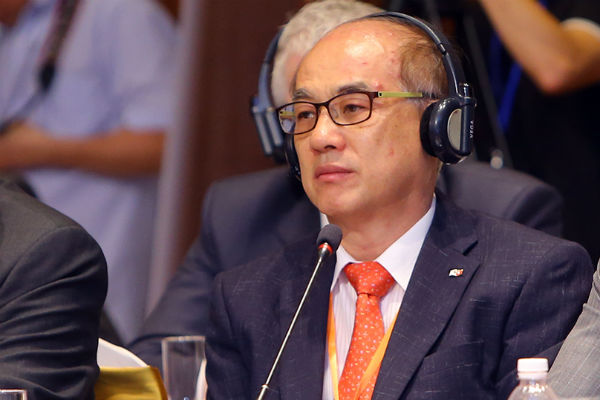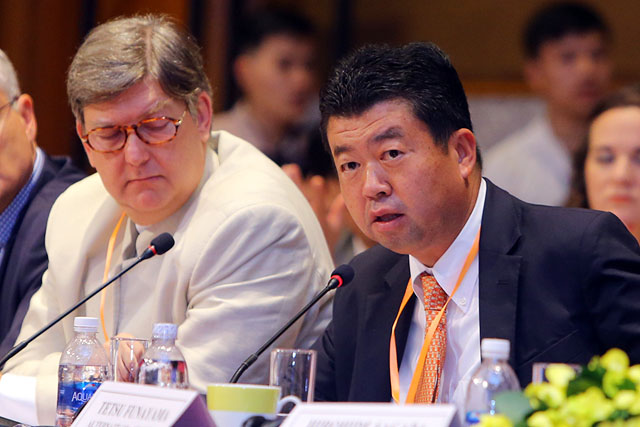Issues to tackle: enhancing the linkage between foreign and domestic investment
 |
| Midterm Vietnam Business Forum 2017 saw a host of proposals from domestic and foreign enterprises |
| RELATED CONTENTS: | |
| Remove import tax on auto components, VBF proposes | |
| Vietnam Business Forum opens in HN | |
| PM attends Viet Nam Business Forum | |
On June 16, 2017, enterprises and state agencies joined in the midterm VBF 2017, based on the theme of “Strengthening the linkage between foreign direct investment (FDI) and domestic investment in the new global context.”
At the forum Deputy Minister of Planning and Investment Dang Huy Dong emphasised the necessity of enhancing linkages, integration, and support between foreign direct investment and domestically-invested enterprises.
“We are concerned about the increasing development disparity between FDI and domestic enterprises, as well as technology transfer. These matters are creating potential conflicts about attracting capital between foreign invested and domestic enterprises,” Dong said.
Kyle F. Kelhofer, senior country manager for Vietnam, Laos, Cambodia at International Finance Corporation (IFC), said that state agencies have tried to make the business environment friendlier to enterprises, and the recent private sector dialogue has borne fruit.
“Vietnam has to change to improve the investment business environment and cooperate to reduce investment and business costs, thereby, developing sustainably. We can find specific measures to face external changes and enhance the competitive capacity of Vietnam. Now it is time for us to do something and have good results,” Kelhofer said.
According to Dr Vu Tien Loc, chairman of the Vietnam Chamber of Commerce and Industry (VCCI), currently, FDI contributes a lot to the Vietnamese economy, however, there are concerns over the limited supply of goods and services from the private sector to the FDI sector.
“About 14 per cent of private enterprises have FDI enterprise clients in Vietnam. However, it is likely that this number will increase in the future, although this may move at a very slow speed. Only 26.6 per cent of FDI enterprises’ goods were purchased in Vietnam,” Loc said.
Midterm VBF 2017 took place when FDI inflows to Vietnam have been affected by recent changes in global policies, such as Brexit, Donald Trump’s policies, the EU Free Trade Agreement (EVFTA), the Trans-Pacific Partnership (TPP) Agreement, the Regional Comprehensive Economic Partnership (RCEP), and the fourth industrial revolution.
Loc said that to strengthen the private sector, the government should connect the FDI and domestic sectors. The government is deploying an ambitious programme with the aim of enhancing the investment environment, promoting the private sector and the linkage between FDI and domestic private enterprises.
Han Dong Hee, chairman of the Korea Chamber of Commerce in Ho Chi Minh City (KOCHAM), said that to connect the two sectors, Vietnamese authorities should establish an investment and cooperation committee to provide FDI enterprises with information about potential small- and medium-sized enterprises and case-by-case consultation.
Below are some proposals the representatives of foreign business associations gave at the conference regarding the problems most pressing for them:
 |
| Ryu Hang Ha, co-chairman of KOCHAM |
Ryu Hang Ha, co-chairman of KOCHAM
In the past, the Export and Import Tax Act and the Enforcement Decree stipulated that “the export duties shall not be imposed on the manufactured products of which raw materials were imported for the purpose of export.” Therefore, export duties had not been imposed in the past.
However, the Export and Import Tax Act (seventh clause of the article 16, 107/2016/QH13) was revised on April 6, 2017, and the Enforcement Decree (the article 12, Decree No.134/2016/NDCP) became effective on September 1, 2016. And, the phrase “the export tax shall not be imposed” was deleted. Therefore, the relevant government agencies are interpreting this as imposition of export duties. As of now, export duties are imposed on products.
For example, 7 to 10 per cent of export duties are imposed on aluminium products. For this reason, many aluminium product manufactures are faced with difficulties while exporting those products from Vietnam, because they have lost price competitiveness in overseas markets.
As of now, the Korean government and the Chinese government do not impose export duties on aluminium products. This is to contribute to the development of domestic industries by securing price competitiveness in the overseas markets. We would like to request the Vietnamese government to exempt export duties for aluminium products. This would enable aluminium product manufacturers to secure price competitiveness and contribute to the industrial development in Vietnam.
 |
| Hiroshi Karashima, chairman of the Japan Business Association in Vietnam |
Hiroshi Karashima, chairman of the Japan Business Association in Vietnam (JBAV)
Vietnam’s current minimum wage (in zone 1) is higher than in the major industrial areas in the Philippines, while Malaysia and Thailand have decided against increasing their minimum wages. Include the costs of social welfare and trade unions, labour-related costs in Vietnam stands at the same level as in Thailand.
Of course, the increases of the minimum wage will contribute to expanding local demand. However, at such a rapid pace, we are concerned that Vietnam will lose its competitive advantage over neighbouring countries. I suppose that it shall be of strategic importance to determine an appropriate annual increase in the minimum wage based on CPI increases.
Moreover, in order to enhance Vietnam’s attractiveness as a country of manufacturing, it is vital to enrich the industrial environment to create added values in addition to labour cost competitiveness.
Based on these, it would be essential to form supporting industries by developing small- and medium-sized enterprises (SMEs) immediately. I find that the new law to support SMEs put forward at the National Assembly shows that the Vietnamese government is aware of this issue, which I highly appreciate.
We expect Vietnam to make further efforts in making it easy to grant work permits to experts employed by enterprises. This will contribute to the further development of supporting industries, not only by improving manufacturing capabilities, but also enhancing human resources.
I believe these points are the most critical to maintain and enhance Vietnam’s international competitiveness. I really wish the Vietnamese government and the Prime Minister would uphold their leadership to swiftly and thoroughly address one specific issue after another.
 |
| Tomas Andreatta, vice chairman of EuroCham |
Tomaso Andreatta, vice chairman of EuroCham
We wish to highlight five issues that need to be addressed to substantially enhance Vietnam’s sustainability and competitiveness in global trade, and benefit the European business community in this country.
First of all, renewable sources of energy may have a smaller scale than traditional alternatives, but they have a much faster implementation time and they do not constrain the country to a long-term commitment to the same source of energy, so we recommend committing even more to making them viable.
Secondly, economic growth and urbanisation are increasing the demand for public infrastructure for goods and services. However, the State budget is only able to meet a small part of Vietnam's infrastructure needs and declining ODA funds are not sufficient to complement this shortfall.
The balance has to come from private investment, through better Public-Private Partnerships (“PPPs”) that balance out the risks and are bankable for international companies, with public bids that are transparent, timely, and fair, and through the full privatisation of the market.
Thirdly, EuroCham calls on the Vietnamese government to ensure that intellectual property rights infringement faces strong legal sanctions, including internet-based operations, and immediately enforceable Cease and Desist Decisions.
We also recommend phasing out the concept that Vietnamese law is precedent to international law in case of conflict, as it creates a high level of uncertainty and undermines the whole concept of allowing both parties to freely choose a specific, well-suited, legal system to govern their contracts.
Fourthly, if Vietnam wants to catch up to the present and move to the future, it has to make clear choices to openly promote what will become the industries of the future. Vietnam can learn from the best of Singapore by spearheading new industries. At the same time, it has to allow the private sector to run its own bets, since some will succeed and some not, but the country as a whole will benefit.
We firmly believe that if it chooses to be the one ASEAN country where electric automobiles and motorcycles are manufactured, Vietnam will emerge from its “me too” follower status to lead at the forefront of the automotive and clean energy sectors. This will also open the way to produce batteries for buildings and cities, to complement intermittent renewable energy. Of course, this has to come with a plan to recycle used batteries.
Finally, many investors in Vietnam face much more stringent administrative challenges at the provincial level than at national level when it comes to opening facilities of their own. This is due to the non-uniform application of laws and policies regarding taxation and customs, as well as the procedures on approving land use rights and other requirements.
Provinces are competing for investment and they should be as open and transparent as possible, while coordinating with the central government to ensure that investors with projects in different provinces are treated consistently. It is in the provinces’ interest to go further than the FTA requirements, for example by inviting international bidders for procurement, thus securing better quality, more variety, and new sources of funding.
| Vietnam Business Forum opens in HN The Annual Viet Nam Business Forum 2016 (VBF) was official launched on December 5 in Ha Noi under the theme “Strengthening the private sector: Forging partnership between domestic and foreign enterprises for a harmonious development of the Vietnamese economy.” |
| VBF provides momentum for action One year has passed since the Consortium of local and international business associations and chambers of commerce took over the International Finance Corporation’s (IFC) coordination role in the Vietnam Business Forum (VBF). With a mid-term meeting slated for June 3, VBF Consortium co-chair Alain Cany speaks with VIR about the impact of the move. |
| VBF to articulate investors’ big concerns Local and foreign enterprises will have an opportunity to directly seek help from the government to lessen their woes at the 2013 mid-term Vietnam Business Forum. |
What the stars mean:
★ Poor ★ ★ Promising ★★★ Good ★★★★ Very good ★★★★★ Exceptional
Latest News
More News
- Hermes joins Long Thanh cargo terminal development (February 04, 2026 | 15:59)
- SCG enhances production and distribution in Vietnam (February 04, 2026 | 08:00)
- UNIVACCO strengthens Asia expansion with Vietnam facility (February 03, 2026 | 08:00)
- Cai Mep Ha Port project wins approval with $1.95bn investment (February 02, 2026 | 16:17)
- Repositioning Vietnam in Asia’s manufacturing race (February 02, 2026 | 16:00)
- Manufacturing growth remains solid in early 2026 (February 02, 2026 | 15:28)
- Navigating venture capital trends across the continent (February 02, 2026 | 14:00)
- Motivations to achieve high growth (February 02, 2026 | 11:00)
- Capacity and regulations among British areas of expertise in IFCs (February 02, 2026 | 09:09)
- Transition underway in German investment across Vietnam (February 02, 2026 | 08:00)



















 Mobile Version
Mobile Version